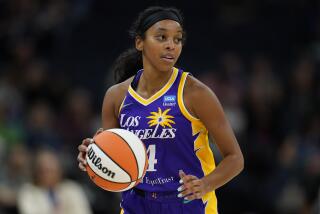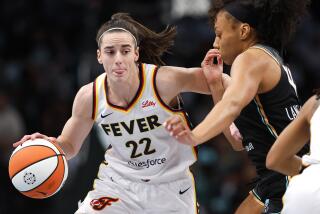Jim Brown, Chris Webber Form Old-New Alliance
WASHINGTON — It was just before midnight on Friday, and Jim Brown and Chris Webber, each of a distinct generation of African-Americans in pro sports, were on opposite sides of the stage at Howard University’s Cramton Auditorium.
A nationally televised “town meeting” on ESPN moderated by ABC’s Ted Koppel that sought to measure racial progress in sports since Jackie Robinson broke baseball’s color barrier 50 years ago, with Webber and Brown among the nine participants, had just ended.
But perhaps a new and potentially significant alliance was about to begin.
Webber, his tall, slender frame draped in a gray double-breasted suit, was bent almost in two to grasp upraised black and white hands in the crowd three-deep that had pressed against the rim of the stage. Brown crouched on his right knee to sign autographs.
The 61-year-old Hall of Fame running back for the Cleveland Browns and champion of fiscal self-determination for African-Americans, had spent the evening on his familiar theme: quietly insisting that African-Americans, especially athletes with wealth and prestige, need to pool resources to create an economic power base.
“If you get to Michael Jordan and all the others, the changes you could make would be unbelievable,” Brown said.
Webber, 23, in the second year of a multiyear contract worth more than $60 million with the Washington Bullets, had stoked other fires.
He blamed the media for creating misconceptions about outspoken black athletes as “uncoachable,” defended the community activities of some young NBA stars and, in the most emotionally charged exchange of the two-hour program, criticized college officials for not providing enough money and amenities to athletes who bring the schools millions of dollars in apparel contracts and broadcasting revenues.
“You’re almost making us take handouts,” Webber said, his voice rising before lashing out at college coaches through fellow panelist Gene Stallings, the former University of Alabama head football coach: “You only come to the ghetto to recruit me.”
Tempers cooled and later, as students and ABC production staffers milled about and prepared to leave, Webber approached Brown. The older man spoke gently to Webber, who nodded thoughtfully, listening intently to the counsel. The private discussion concluded with an embrace.
“I hadn’t met him before tonight,” Webber said later. “My father told me a lot about him. ... I asked him what I could do to help, and he gave me a few ideas. He told me to call him whenever I wanted to. I’m going to. It’s a good starting point.”
Said Brown: “It was good for him to experience something like this. The young man made some excellent points. He has an open mind. I hope we hear from him.”
Indeed, Webber’s tone had seemed to soften as the town meeting wound down. In his closing comments, Webber directed his words to Brown and panelist Harry Edwards, the Berkeley sociologist who has been a key figure in black activism since the 1960. “I don’t know how hard your role was ... If there’s something we (the athletes of his generation) can do, let us know.”
Throughout the show, Webber and Brown had elicited the most applause from the crowd of about 1,200 at Howard, where Robinson and Dr. Martin Luther King received honorary degrees in 1957.
Edwards also drew cheers during an exchange about the value of education versus a huge pro contract. “When someone walks in and puts $30 million on the table,” Edwards said, “if he’s not smart enough to take it, he’s not smart enough to go to college anyway. ... If somebody walks in to offer my son $30 million and he says, ‘Dad, no, I’m going to college,’ I’m going to take him to have his head examined.” Edwards said he would make sure his son later finished his education.
The jeers were primarily aimed at major league baseball, which was not represented by an owner or active player. Bud Selig, baseball’s acting commissioner, and Seattle Mariners superstar Ken Griffey Jr., appeared only in a taped opening. “We invited all of them,” Koppel said.
Jerry Colangelo, the owner of the Phoenix Suns, Arizona Diamondbacks and the Phoenix Coyotes, had accepted but couldn’t attend because he was called to the bedside of his ill mother-in-law in Colorado. Koppel said ABC contacted every baseball team and the commissioner’s office but were told no one could make it on such short notice.
“I’m disappointed in my sport,” said Joe Morgan, the Hall of Fame second baseman and ESPN/NBC analyst. “There is not a Bob Kraft (the New England Patriots owner and a panelist), not a Chris Webber here.”
It was left to Clifford Alexander, the former secretary of the Army and a consultant to baseball on minority hiring, to represent baseball executives. “It pains me to have a black lawyer to answer questions that should be addressed to white owners,” Koppel said.
Alexander defended baseball’s hiring record, saying that in front offices, the number of minorities had improved from 2 percent to 20 percent in nine years and noted, “I don’t see any other commissioners here.”
Responded Koppel: “But this is a show about Jackie Robinson.”
More to Read
Go beyond the scoreboard
Get the latest on L.A.'s teams in the daily Sports Report newsletter.
You may occasionally receive promotional content from the Los Angeles Times.










